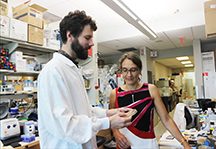Scripps Florida Scientists Identify Protein Deficiency Involved in Childhood Anemia and Cancers
By Eric Saute
Scientists from the Florida campus of The Scripps Research Institute have shown how the lack of a specific protein may be a significant contributing factor to a devastating childhood anemia that has been closely associated with a 30-to-40-fold increase in the incidence of colon cancer, osteosarcoma and leukemia in those who suffer from it.
The new research, which was published in the journal Nature Structural and Molecular Biology, was led by TSRI Associate Professor Katrin Karbstein.
These new findings provide the first molecular understanding of the pathology of the disease known as Diamond-Blackfan anemia – and offer a potential target for developing new therapeutic approaches.
Karbstein’s research focuses on the assembly of ribosomes—large macromolecular machines that produce proteins by decoding information carried in messenger RNA (mRNA) and then turning that code into proteins, assembling them from amino acids. Problems in the assembly process or in messenger RNA (mRNA) can lead to serious problems, including birth defects like Diamond Blackfan Anemia and cancers.
In the new study, Karbstein and her colleagues show that the reduced levels of a protein known as Rps26, which are caused by Diamond-Blackfan anemia, lead to the formation of RPS26-deficient ribosomes. These Rps26 deficient ribosomes disrupt the translation of essential mRNAs, leading to reduced overall ribosome production, which helps drive the disease in the first place. The result, Karbstein said, is something of a paradox.
“Diamond-Blackfan patients tend to develop very specific cancers, far more than normal people,” she said. “But cancer cells need lots of ribosomes, which is the exact opposite of what is happening in Rps26-deficiency. The cancer might arise because of the new functions that the Rps26 deficient ribosomes develop.”
While this population of deficient ribosomes is capable of binding mRNA, they actually prefer a different population of transcripts – single strands of RNA -- than their normal counterparts, distinguished by a specific arrangement of nucleotides on the mRNA molecule known as Kozak sequences that help efficient translation.
As a general rule, mRNAs with a good Kozak sequence get translated more readily than others because they produce proteins with critical cellular functions. But Rps26 deficient ribosomes don’t care that these normal mRNAs are supposed to be privileged– its popular democracy in action. “They like all ribosomes,” Karbstein said. “So the privileged ones are doing less well, and the translation of what you might call the less privileged increases. That’s the critical difference. This increase perturbs the homeostasis and disease follows soon after.”
What causes this deficit in the first place? Besides the genetic causes, which lead to inherited disease, the study also revealed the surprising finding that exposure to high salt and pH stress can lead to the formation of Rps26-deficient ribosomes.
“We have long suspected that Rps26-deficient ribosomes might be the cause of diseases like Diamond Blackfan Anemia,” Karbstein said, “but we haven’t known that they have physiological roles in the response to environmental stresses. This is likely the reason that they are not discarded by cellular quality control pathways in the first place.”
“We found that ribosomes deficient in the protein Rps26 preferentially translate mRNAs from specific stress response pathways,” said Max B. Ferretti, the first author of the study. “Further, we show that yeast exposed to these stresses respond by removing Rps26 from their ribosomes, which shows how a general ribosomal defect dysregulates translation. “ In addition to Karbstein and Ferretti, other authors of the study, “Rps26 Directs mRNA-Specific Translation by Recognition of Kozak Sequence Elements,” are Homa Ghalei, Ethan A. Ward and Elizabeth L. Potts of TSRI.
The study was supported by the National Institutes of Health (Grant numbers R01-GM086451 and F31-GM116406), the PGA National Women’s Cancer Awareness Fellowship, the Richard & Helen DeVos Graduate Fellowship and the Howard Hughes Medical Institute.
Send comments to: press[at]scripps.edu














